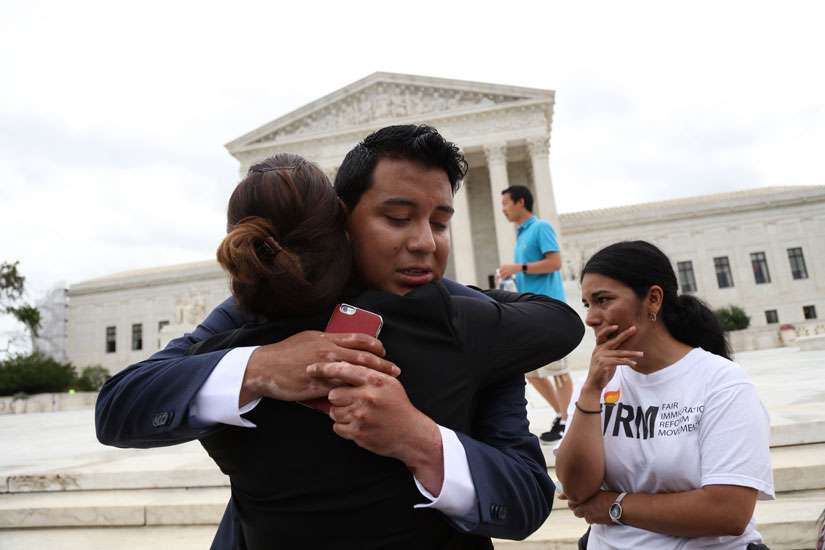The court's 4-4 vote leaves in place a lower court injunction blocking the administration's immigration policy with the one-page opinion stating: "The judgment is affirmed by an equally divided court."
Legal experts have called it an ambiguous and confusing political and legal decision that leaves many in a state of limbo. It also puts a lot of attention on the vacant Supreme Court seat that may determine how the case is decided in an appeal.
Bishop Oscar Cantu of Las Cruces, New Mexico, said the court's decision is "a sad ruling." He described the president's immigration plan as "the result of years of painstaking work and committed efforts by migrant advocates, grassroots organizations, some legislators and the faith community."
The bishop, chairman of the U.S. bishops' Committee on International Justice and Peace, added that the court's decision exposes how current immigration policy in the United States "criminalizes and scapegoats immigrants who fight for a better life for their children and families that contribute every day to our economy and communities."
In a news briefing, President Barack Obama said the country's immigration system is broken and the Supreme Court's inability to reach a decision set it back even further.
At issue in the United States v. Texas case are Obama's executive actions on immigration policy that were challenged by 26 states.
"I am deeply disappointed by the Supreme Court's decision ... putting millions of families at risk of being ripped apart," said Dominican Sister Bernardine Karge of Chicago, speaking for the Washington-based group Faith in Public Life.
"The stories of immigrant families are intimately woven into the tapestry of this great country, and today's decision threatens our nation's commitment to justice and compassion," she said, adding that she hoped the presumptive presidential nominees and Congress makes comprehensive immigration reform a priority.
The case, argued before the court in April, involved Obama's 2014 expansion of a 2012 program known as Deferred Action for Childhood Arrivals, or DACA, and creation of the Deferred Action for Parents of Americans and Lawful Permanent Residents, known as DAPA.
The programs had been put on hold last November by the 5th U.S. Circuit Court of Appeals in New Orleans, upholding a Texas-based federal judge's injunction against the executive actions.
The states suing the federal government claimed the president went too far and was not just putting a temporary block on deportations, but giving immigrants in the country without legal permission a "lawful presence" that enabled them to qualify for Social Security and Medicare benefits.
U.S. Solicitor General Donald B. Verrilli Jr., who defended the government, said the "pressing human concern" was to avoid breaking up families of U.S. citizen children, something echoed by the U.S. Conference of Catholic Bishops, Catholic Legal Immigration Network Inc., or CLINIC, and at least three Catholic colleges, which joined in a brief with more than 75 education and children's advocacy organizations.
When the case was argued before the high court in mid-April, Justice Sonia Sotomayor stressed that the four million immigrants who might be given a temporary reprieve from deportation "are living in the shadows" and "are here whether we want them or not," adding that the government had limited resources available for deportations.
Thomas Saenz, a lawyer representing three mothers in in the country without documentation who have U.S. citizen children, told the court his clients live in "daily fear that they will be separated from their families and detained or removed from their homes."
On the day the Supreme Court heard arguments in the case, the plight of families was visible with many gathered in front of the court hours before the arguments began carrying placards saying: "Fight for families," and "Love your neighbour" while a mariachi band played alongside them.


